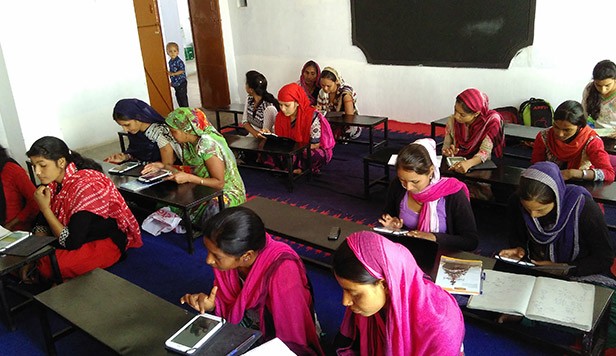By Ami Misra, Programme Specialist, National CSR Hub, Tata Institute of Social Sciences
Women’s empowerment is a buzzword in contemporary times. However, the nuances of this buzzword are seldom understood with all its complexities.
The Indian landscape has a large variety of actors advocating for and promoting the cause of women. Apart from having a Cabinet Ministry dealing with Women and Child Development at the Central level, the Indian Government has special commissions for women at the union and state levels that cover a broad range of issues related to gender justice. The Indian feminist movement is also active in its existence as thought leaders, collectives, grassroots civil society movements and organisations.
The extent of the women’s problems in India is vast. India has a patriarchal society which affects individuals socially, economically and culturally. The reproduction of gender roles, male dominance, sexism and misogyny are common in a patriarchal society. According to the Gender Inequality Index, India ranks high at 127 out of the 160 countries surveyed in the year 2018. The Gender Inequality Index uses the indicators of reproductive health, empowerment, and economic activity.
In such a gendered society, the bulk of domestic and care work (which is underpaid or unpaid) lies on women. Moreover, the double burden of managing the home and work is also a reality across class sections (from influential women leaders working for multinational corporations to daily wage women labourers working in the unorganised sectors).
The lesser paying sectors (e.g. manufacturing processes in fast fashion) are by default assigned to women in this globalised economy thereby reproducing already persistent wage gaps between genders. The issues of violence, sexual harassment, decision-making, political participation and access to cultural rights are also legitimate problems faced by women.
Given the quantum and extent of women’s problems in the country, the state and civil society cannot alone solve the problem. There is a need for multiple development actors to produce a ripple effect of actions towards establishing gender parity.
The corporate sector can play an important role in contributing towards the cause of women’s empowerment. Empowerment is when individuals can express power “to” act, “with” associations and experience it “within”. Women’s empowerment has to be understood in this context as well. One approach for bridging the gap is through gender mainstreaming.
Gender mainstreaming uses three kinds of strategies to create impact and change the everyday realities of women. These three strategies are focussed on empowering women by expanding their agency in being able to negotiate with power structures. Agency here refers to the sociological concept that focuses on an individual’s capacity to act independently and by choice.
Structures of power are deep rooted in the Indian scenario. These power structures are influenced by the hierarchical and pluralistic intersections at the ground level. Unequal power relations affect an individual’s access to opportunities.
Gender is an overarching social category among other intersections like caste, class, religion and ethnicity. The omnipresence of gender as an intersection therefore justifies the need for programmes and interventions focussed on improving the status quo.
The approach of gender mainstreaming programmes can help in ameliorating gender based discriminatory practices. Under gender mainstreaming, the consequences of programmes on men and women are assessed across the programme cycle – in planning, monitoring, and implementation. According to UN Women, the primary objective behind gender mainstreaming is to design and implement development projects, programmes and policies that are:
- Gender Neutral: Programmes and policies that do not reinforce existing gender inequalities come under this category. Gender norms, roles and relations are not affected (for better or worse). The neutrality of the intervention ensures that equality of opportunity is available to both genders. Gender is not relevant to the intervention.
- Gender Sensitive: Programmes and policies that attempt to redress existing gender inequalities are considered gender sensitive. Responding to the inequalities that persist in the society is an important function while delivering such interventions. Here, the importance of gender is seen as important so far as to achieve the development outcomes desired under the programme. Gender is a measure to reach identified development goals.

- Gender Transformative: Programmes that attempt to re-define women and men’s gender roles and relations are considered gender transformative. Under this approach, long-term changes in individuals’ access to opportunities are changed as the normative discriminatory gendered practices are challenged. Gender is considered central to the programme design.
To better understand the context of gender mainstreaming within corporate social responsibility in India, here are three examples of CSR projects with their alignment to the above-mentioned categories:
| Category | Gender Neutral | Gender Sensitive | Gender Transformative |
| Name of Project and Enterprise | Ride Safe India initiative by Hero MotoCorp Limited | Roshini: Digital & Economic Empowerment of Women by IDEA Cellular | Project Swayam by RPG Group |
| About the Project | Under this initiative, Hero MotoCorp regularly organises Road Safety Awareness and Safe Riding Education programmes for school/college students and other institutions in collaboration with local administration, traffic police, and transport departments. | Under this initiative women are imparted digital literacy training to use internet on their smartphones. This initiative connects women to the internet to gain access to important information and services such as healthcare, banking, and education and earn a living too. | Swayam provides training to women from less privileged backgrounds to work in the non-traditional transport and logistics sector as commercial drivers, last mile two-wheeler delivery professionals, forklift operators, autorickshaw drivers amongst others. |
| Analysis | This project is Gender Neutral because (i) it does not deliver the intervention based on gender; and (ii) no gender roles or stereotypes are reinforced by its implementation. | This project is Gender Sensitive because (i) it seeks to fill gaps which are caused by gender; and (ii) it customises delivery according to the needs of women specifically. | This project is Gender Transformative because (i) it challenges existing gender stereotypes and roles; and (ii) attempts to bring long-term transformational changes to the lives of the women beneficiaries. |
Applying such analytical frameworks to corporate social responsibility in India can help in achieving gender justice. It is critical that women’s empowerment and gender is seen as more than an afterthought while implementing CSR projects.
Corporates must try to incorporate gender mainstreaming strategies not only in their corporate social responsibility projects but also through improving the corporate governance structures.
A version of this article first appeared in our April 2019 print edition. To grab a copy of the magazine, click here
 Apart from being a Programme Specialist at the National CSR Hub, TISS, Ami is part of the TISS AESDII team. She has worked with UN Women, Columbia Global Centers | Mumbai and the NITI Aayog (and erstwhile Planning Commission), Government of India. Ami has a Certificate of Advanced Studies in Public Governance and Administration from ETH Zurich and a Master of Art degree in Women’s Studies.
Apart from being a Programme Specialist at the National CSR Hub, TISS, Ami is part of the TISS AESDII team. She has worked with UN Women, Columbia Global Centers | Mumbai and the NITI Aayog (and erstwhile Planning Commission), Government of India. Ami has a Certificate of Advanced Studies in Public Governance and Administration from ETH Zurich and a Master of Art degree in Women’s Studies.
Views of the author are personal and do not necessarily represent the website’s views.
Thank you for reading. Please drop a line and help us do better.
Regards,
The CSR Journal Team

